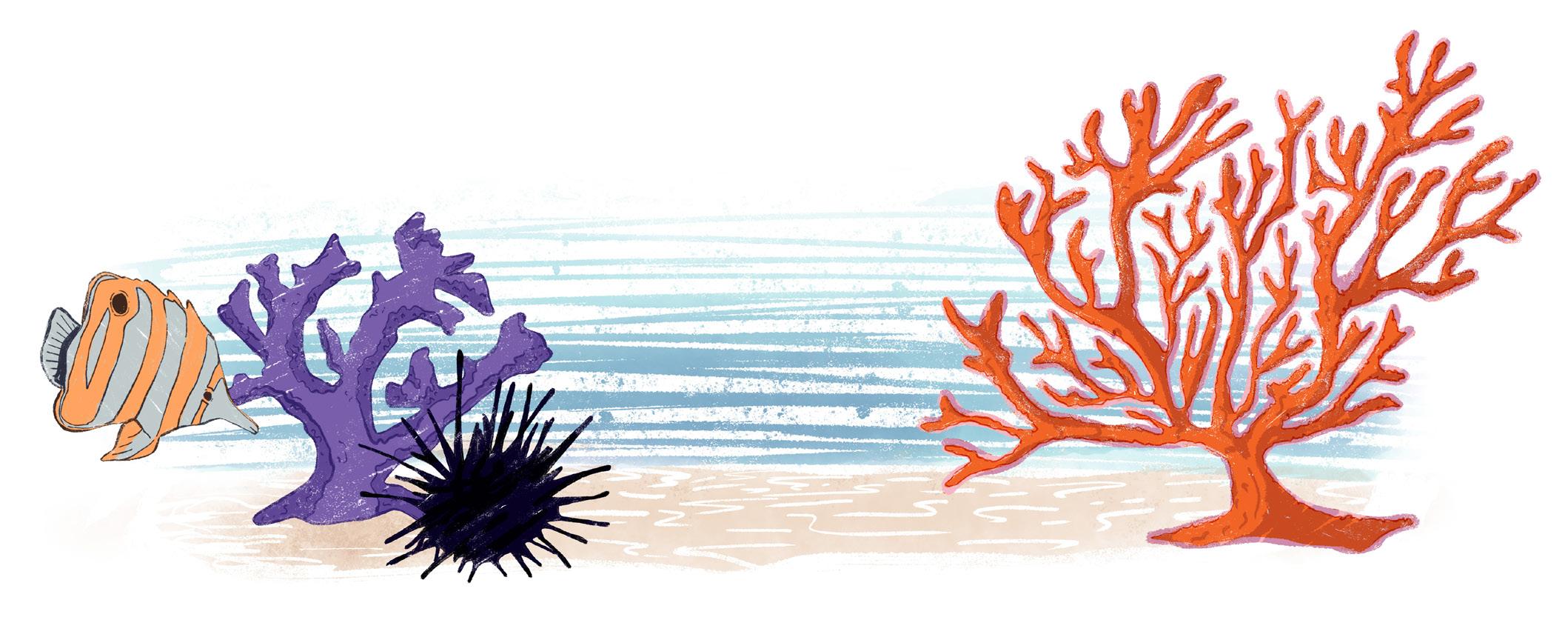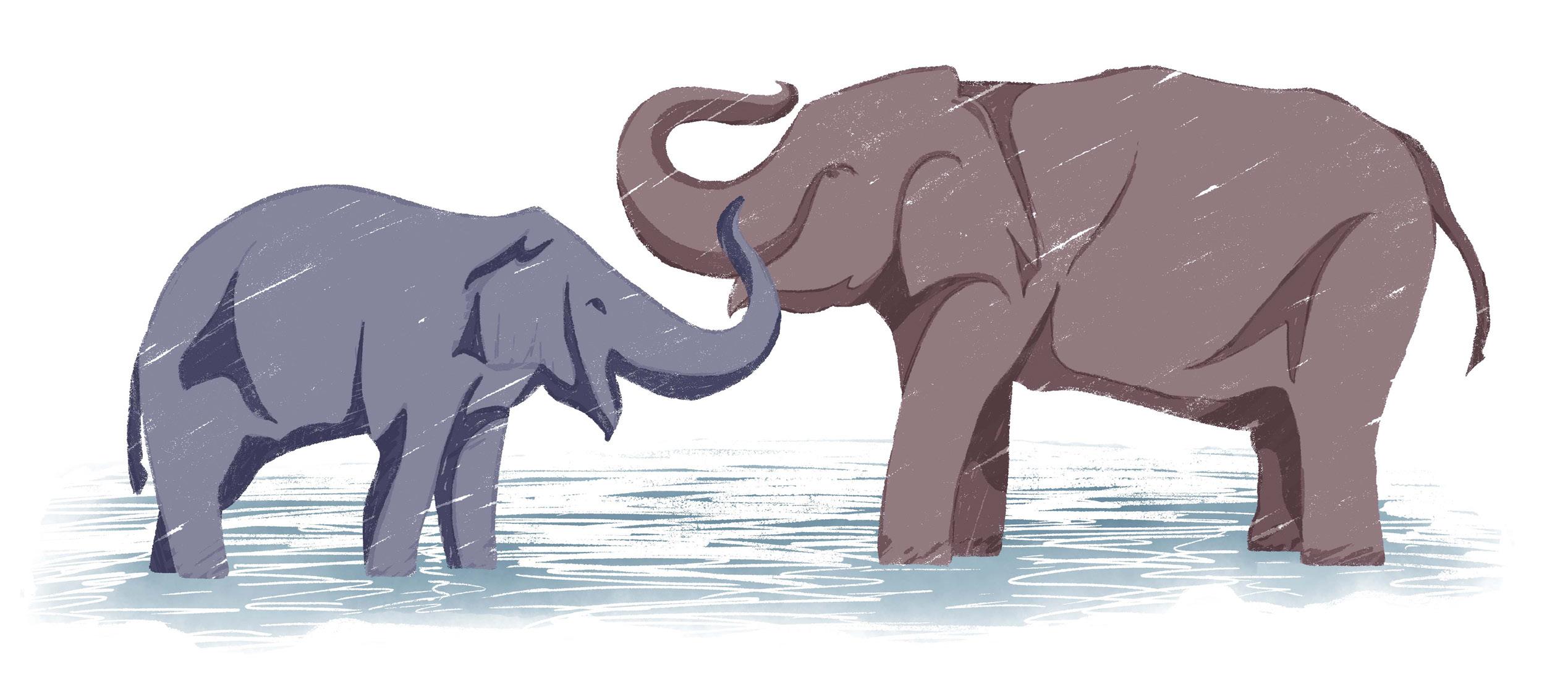
9 minute read
Careers in conservation
Save the planet, GET PAID
Hawaii-based conservationists share their paths to success through gaining well-rounded skills, and not being afraid to change career paths
BY ANNA STEPHENSON
Three conservationists said finding a career in conservation after graduation can be daunting, but not impossible.
Savili Kamuela Bartley, Jr., from Waianae, said he went from working in IT, to traveling around the world as a volunteer working on conservation projects with elephants, coral and plastic-related effects on the environment. He currently works as an intern at the Loko Ea fishpond in Haleiwa.
He said, “If there are volunteer opportunities at nonprofits that you are interested in, go for it. Check different website platforms to find available positions, such as conservation job boards or conservation careers. Also, if you are able or are interested in traveling, I 100 percent would recommend this because you will view the world in a totally different lens, and it will open your mind to so many things.”
Rae Okawa, from Kawaihae, said she got a master’s in environmental studies and started out as a field researcher in Pennsylvania. She said she then switched to a development coordinator for the Hawaii Wildlife Center and has worked there full time since 2012.
She said, “You can take what you’re good at or what you’re interested in and find a way to work it into conservation. And don’t get discouraged if your path changes along the way. It happens.
“If hard-core science and research is your thing, then great! If it isn’t your thing, that’s also fine. Perhaps environmental policy or law is more interesting to you. There’s also environmental education and outreach, media and communications, graphic design and more.” She explained all these are helpful in the conservation field.
Rebecca Choquette, from Pearl City, said she studied veterinary science for two years before she decided she wanted to work in conservation.
“The biggest setback I faced,” she explained, “was realizing and admitting the goal I had set for myself, veterinary medicine, needed to change. It wasn’t what I wanted to spend my life doing.” Choquette said this was a “painful realization” because she had already been studying veterinary medicine for two years and had wanted to be a veterinarian her whole life.
However, after school, she landed the “perfect job” at the Reptile and Keiki Zoo at the Honolulu Zoo.
Following his passion around the world
Bartley said, “From a young age, I was always fascinated with the ocean and knew that I wanted to be a marine biologist. With that dream, I took a marine science class in high school and then decided to focus on biology in college.” Bartley said he attended a university in Iowa because of a scholarship. He graduated in 2017 with a degree in biology because the university he attended did not have options in marine biology, he explained.
After school, he said he could not find a job within the biology field, so he worked in IT for two years. Because working at a desk was difficult, he said he saved his money and eventually told his boss this was not the right job for him. “After that, I vowed to myself that I would never work behind a desk again, and I would pursue my passion for biology through conservation.”
He then went abroad by seeking out hands-on working opportunities in Asia, he reflected.
In Thailand, he worked with Asian elephants. “With this opportunity, I lived in a rural hill-tribe village about a six-hour drive from Chiang Mai. I lived in a villager’s hut. … Every morning we would hike out to find the elephants we were observing.”
He said he collected data to help people learn about how to work with the elephants in an ethical way and also “immersed [him]self within this different, unique and beautiful culture.”
He said, “I also was very keen to start networking within this niche internationally and see where to go from there.”
After Thailand, Bartley said he visited Malaysia and built a “new coral nursery and [learned] how to properly propagate healthy corals in a new location. I did this on a beautiful island off the eastern coast of Malaysia, ... the Perhentian Islands.”
Indonesia and Bali were next, he recounted, but Lombok, the island next to Bali, was the most productive. “In Lombok, I made connections with a nonprofit that focused on educating the local communities about sustainability and the negative effects of plastic pollution.”
Being able to travel and see the world cemented Bartley’s dedication to conservation, he said, because he wanted to do all he could to make the world a better place. He said he was able to do research with sea urchins and the effects of zinc oxide. However, due to the pandemic, Bartley said he had to leave Indonesia and return to Hawaii.
“I told myself when I go home, I will dedicate my time to deepen my roots in my Hawaiian culture, all while trying to make a difference through conservation work.” He started working with Kupu, a Hawaii-based conservation and sustainability centered internship placement and service-learning program, where he was accepted into the Loko Ea program.
The Loko Ea fishpond in Haleiwa is taken care of by the Malama Loko Ea Foundation. He said Loko Ea has become very special to him.
“I felt the mana of this place, and I knew this is where I will deepen my roots and grow as an individual, as a student, as a Hawaiian and as a conservationist. The work we do here is more than aina work, it is a haven for all our native animals and plants to make a comeback.
“Loko Ea is a space for the community to leave their problems at the gates and forget time. This place is where our keiki and our future generations can come to learn hands on and connect to the past by recognizing the foundation that has been laid out by our kupuna. The work we do at Loko Ea is important for the land, for the community and for Hawaii.”
Bartley said his advice to new conservationists is to jump in with both feet and take every opportunity possible. He said to get involved in volunteer opportunities that interest people and check job boards and postings. “Everyone has their own path, and my path has led me to Loko Ea. So the next question is, where will yours lead?”


Preserving nature through different disciplines
Okawa said, “I was born and raised on Oahu and always knew that I wanted to come home after grad school to work in Hawaii conservation.
“I went to Cornell University for college, graduating in 2010 with my bachelor’s in biological sciences and then attended the University of Pennsylvania, graduating in 2012 with my master’s in environmental studies.”
She then found a job as a field researcher but found it difficult to do the job from Pennsylvania. She said after searching, she found and landed an internship at a well-known environmental nonprofit organization. During her work with the organization, she reached out to the Hawaii Wildlife Center to inquire about receiving assistance in creating a conservation fundraising plan. Okawa then got a job there as the development coordinator.
She said, “There are certainly days when I miss being out in the field, banding birds and checking nest boxes. However, that’s more than made up for by the fact that my work with the Hawaii Wildlife Center has provided the resources for hospital and rehabilitative care for nearly 2,000 native Hawaiian birds and bats since I first began working here.”
Okawa said she pins her success on flexibility. “The conservation field is quite broad. I wanted to be well-rounded, so I tried to fit in areas of study outside of my biology degree, completing courses in environmental law, natural resources management and economics.
“When I went for my master’s, I shifted gears and focused more on education, outreach and communication and also took courses in environmental policy, nonprofit management, quantifying sustainable business practices, philanthropy” and others. By being flexible and well rounded, she said she was able to avoid setbacks and disappointments by letting her circumstances guide how she would work in the conservation field.
She advised current conservation students to follow in her footsteps by remembering there are many opportunities in the conservation field. Preserving nature, she said, requires a multitude of different professions and disciplines all working together.
Okawa encouraged all conservation students to take at least one course in communications, citing how being able to effectively communicate with people will be a key skill in any profession they may go into.

Perseverance is key
Choquette grew up on the Big Island then moved to Oahu to attend college at UH Manoa, she recalled. “Moving from a rural environment on the Big Island to an urban one on Oahu for college was a difficult adjustment. When I started college, my goal was veterinary medicine.” She said during school, she volunteered for various veterinary opportunities but decided to change her major to zoology.
She said this was challenging and “switching majors also meant it would take me longer to graduate, and I was mostly paying my own way through college.” She said she worked as a waitress in Waikiki to support herself during this change.
Choquette said she has “a passion for reptiles, amphibians and insects. All the weird, creepy-crawly animals many people dislike.” She said she applied to the Department of Land and Natural Resources for field work, but “by coincidence, a few months after graduation, a position opened in the reptile department of the Honolulu Zoo.” She said this was the “perfect position for me.”
Now, Choquette is the working supervisor for the Reptile and Keiki Zoo at the Honolulu Zoo and has been working there for 27 years.
Choquette explained the staff at the Honolulu Zoo work with the DLNR to “breed and exhibit Kamehameha butterflies, which are the Hawaii state insect.” She said these butterflies are endangered.
“We also breed Amastra cylindrica land snails, a species that was extinct in the wild until DLNR began a reintroduction program. … They are on display here, helping to educate local folk and visitors alike about some of Hawaii’s endangered species and the challenges they face in our current environment.”
The Honolulu Zoo’s Aloha ‘Aina Conservation Fund supports conservation in different environments and has many partners, Choquette explained. Animal keepers from the Honolulu Zoo often participate in research projects all over the world. Overall, she explained, it’s an important force for conservation. •
Graphics by Sadie Madriaga.











